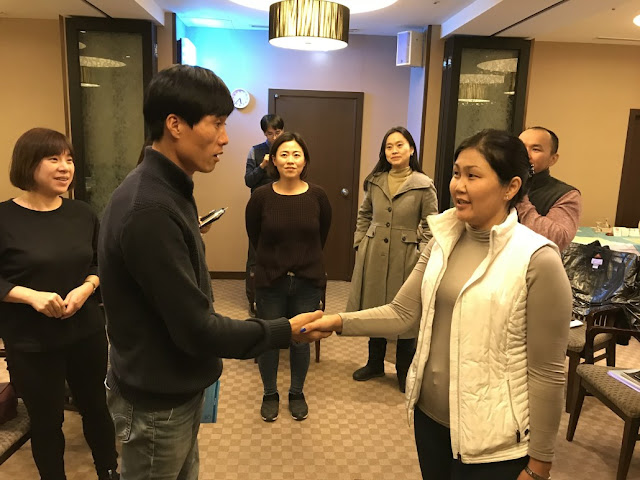One of the worst things one of our volunteers said a few years ago when one of the North Korean refugees in FSI (formerly TNKR) was scheduled for another speaking opportunity: "Oh, I've already heard that refugee's speech, so I won't be missing anything."
She didn't mean to be rude, I'm sure. It is mainly a misunderstanding about what we are trying to do with our public speaking program. So many people look at refugee speakers as a snapshot, that when they hear a refugee once, they've got that refugee's story, and they are ready to move on to the next refugee. What they don't know is that many refugees develop their speeches. We don't expect them to be perfect or polished speakers when they first join us, we expect them to develop.
There are many refugees who have no concept of public speaking when they first start with us. And even though many reporters and their editors want to hear from refugees who have just escaped from North Korea, the reality is that many newcomers don't have much to say. There are some refugees who take some time to get the confidence to talk about things. In other cases, they start to get a sense about things audiences want to learn about. And still in some others, they will open with some audiences that seem open rather than judgmental about them. As I have heard several refugees say over the years, most South Korean audiences aren't ready to hear the reality of North Korea.
Where there is a debate about which term to use, refugee or defector, I make the point that some refugees become defectors after they arrive in South Korea. I have seen many North Korean refugees change after they learn about North Korea. I have seen a few who have gotten angry when they learned more about the evil of the North Korean regime. For some of them when they were in North Korea, it just seemed to be a problem with local officials, that someone with power had targeted them or that a family member's problems had made staying untenable. After escaping, they learned that it was a bigger institutional problem, that the system was designed to strip them of their rights and humanity from birth.
My point: A speaker you see in 2015 will probably be different from the speaker you see in 2021 and beyond. This isn't about people who have escaped from North Korea. A person who reads a book at age 16 will have deeper understanding about it at age 36, with more life experiences to draw upon. Reporters and researchers are constantly seeking that refugee who just arrived in South Korea, but they usually lack perspective. As I heard one political philosopher say one day, Sometimes you have to know two countries before you can understand your own.
We sometimes would struggle with volunteers who wanted to take shortcuts, put words in the mouths of refugees, even want to write speeches for the refugees. Some would get bothered by our restrictions, but we want the refugees to develop their speeches based on their own ideas and their own intellectual and personal development.
That has been definitely true of Ken Eom! When he first joined us in March 2015, I wasn't sure that we should allow him to speak at another event. I won't discuss the problems, but I did talk to his volunteer coaches to give them feedback and to encourage them to be more structured with him.
He has done a lot of reading about North Korea, sharpened his English, done a lot of thinking, and given many speeches. It wasn't just the volunteers or our structure, Ken had the burning desire to say something. We now have a case of a man who was once loyal to the North Korean regime now denouncing it, even speaking multiple times to US military. (October 2015, March 2016, December 2016).
Ken graduated from Korea University with a master's degree in public administration and has many opinions. He can tell stories about his life, analysis about North Korea, also higher level public policy. I can tell that he is not interested in continuing to repeat the same stories about his life, like a musician who grows tired of singing his first hit and wants to expand to new music.
Last week Ken did both, telling his escape story from North Korea and also mixing his analysis and commentary about North Korea.
This event in 2018 was with tourists visiting from abroad. These events gave the speakers in FSI (now TNKR) the opportunity to develop their public speaking skills in low-pressure, even supportive situations.
Ken's fundraiser for FSI.
* * *
I kicked off the event by introducing TNKR (renamed in 2021 as FSI).









